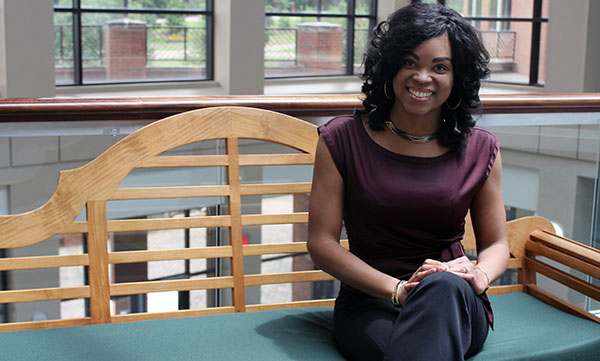Cooperation crucial in face of prejudice, educator says
By: LAUREN PRINGLE
Mar 05, 2021

Dr. Simone T.A. Phipps (Photo from Middle Georgia State University)
In honor of Black History Month, Claflin University hosted a Zoom call that touched on the preconceptions of African Americans and the prejudice they encounter every day in the United States.
Dr. Simone T.A. Phipps, associate professor of management at Middle Georgia State University and a Claflin University alum, was the guest speaker for the event.
She gave insight on how cooperation can be very useful, especially for African Americans, when it comes to advancing and progressing while in the face of prejudice.
Phipps said many people get prejudice, racism and discrimination confused because definitions can often be blurred into one another.
“Prejudice refers to the beliefs, thoughts, feelings and attitudes someone holds about a particular group. Prejudice is really about the thoughts that people have about someone. They literally prejudge someone based on the group that they belong too,” Phipps said.
Discrimination differs from prejudice and is like a stronger type of prejudice and typically deals with the actions against a particular group or people. She cited examples: saying that only whites can enter into a specific store or that only whites get hired at specific jobs.
“When you put these two words together, prejudice and discrimination, that’s when you get to racism ... racism is very well used to justify the belief that one racial group is somehow superior or inferior to others. That is the thinking aspect and the judgment thought of it. It’s also used to justify practices that allow people to put racial majority usually above a racial minority,” Phipps said. “Racism leads to racial inequality.”
Phipps then touched on Critical Race Theory and how it is very prominent, especially in the United States.
Critical race theory is the framework and concept that examines the society and culture as it relates to the arrangement of race, law and power in the United States. Many people are trying to push back against this and say that none of this is true and that no one experiences racial inequality.
“That’s not true. You see all of these racial inequities. Usually, people of color earn less and they are forwarded less employment opportunities. They are not fair in the hiring practices when it comes to promotion or advancement and even when it comes to self-employment, there are obstacles in your way because of race,” Phipps said.
Phipps also declared that housing opportunities are extremely few. They direct people of color into certain neighborhoods that are not deemed as high end or luxury as opposed to their white counterparts. This causes disproportionate levels of homelessness and incarceration. Once you have been incarcerated, it becomes extremely hard for you to get a job or to do anything, which causes people to resort to other things to stay afloat within society.
“All of these inequalities exist, and we are very familiar with them. People are trying to push back and say you know it really isn’t that way and refer to the situation as pulling yourself up by the bootstraps,” Phipps said.
Phipps addressed the need for cooperation.
“There is term from the Akan people of Ghana that means to go back and get it. That term is Sankofa and that is exactly what we should be striving to do. We should be going back to get those philosophies and those traditions from the past from history and use those traditions to help us reclaim that positive future,” Phipps said.
In Africa and the African diaspora, cooperation is a huge and significant tradition. Throughout history, numerous things have taken place within Africa to help people due to the inequity and prejudice that they face.
For example, there is a term “Susu” that is used in Ghana. It is typically where a group of people pay a certain amount of money to a collector. Each time someone contributes money, one of the people who paid will receive the entire sum. Thus, providing cheap credit that would be difficult to obtain somewhere else due to racism or other reasons.
“I want to stress the importance of cooperation as one unified Black community because sometimes you end up with divisions. ... Instead if we look at each other as one black community, unified and we work together and cooperate to help each other and to make sure that there is progress as a community, things can be a lot better,” Phipps said.
If the Black community continues to uplift, look out for one another and cooperate with each other, they can overcome any obstacle that is unfairly thrown toward them and their community and advance and progress in the face of prejudice as opposed to struggling.